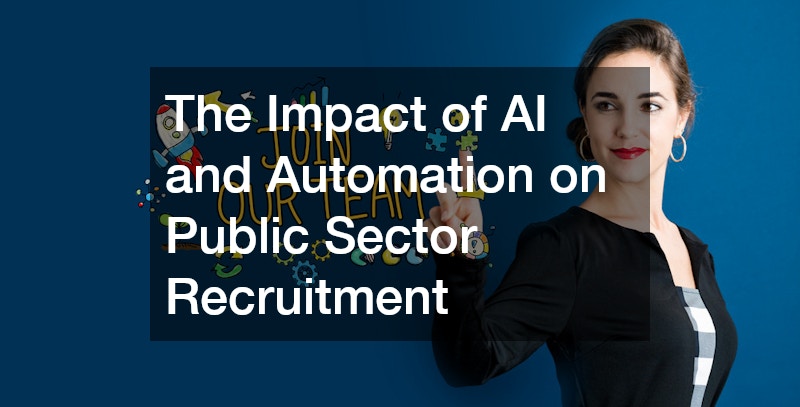Artificial Intelligence (AI) and automation are redefining industries globally, and public sector recruitment is no exception. Traditionally, recruitment in the public sector has been characterized by manual processes, long hiring cycles, and stringent compliance requirements. However, with the integration of AI and automation, these dynamics are rapidly changing. Public sector organizations are now leveraging these technologies to streamline operations, enhance the candidate experience, and address evolving recruitment challenges.
In this article, we’ll explore how AI and automation are transforming public sector recruitment and what this means for both candidates and public sector recruitment agencies.
Streamlining Recruitment Processes
One of the primary impacts of AI and automation is the significant reduction in time-consuming, manual tasks. A public sector recruitment agency traditionally sifts through a large volume of applications, often requiring extensive human resources. AI, however, can automate tasks like screening resumes, parsing job applications, and identifying qualified candidates based on pre-defined criteria.
With AI-driven applicant tracking systems (ATS), public sector recruitment specialists can now focus on more strategic aspects of hiring, such as candidate engagement and final decision-making. Automation also helps track applications, manage scheduling, and send out communication to applicants, thus reducing the administrative burden on recruiters.
Enhancing Candidate Matching with Predictive Analytics
AI has brought the power of predictive analytics to public sector recruitment. Machine learning algorithms analyze past hiring data, industry trends, and specific job requirements to predict which candidates are the best fit for a position. These algorithms can evaluate a candidate’s resume, skills, and even behavioral attributes to provide recruiters with a shortlist of highly qualified individuals.
This predictive capability allows public sector recruitment specialists to make more data-driven decisions. Instead of relying solely on intuition, AI enhances decision-making by providing objective insights that may not be immediately apparent through human review. Moreover, AI can reduce bias in recruitment by focusing purely on qualifications, thus promoting diversity and inclusion in the public workforce.
Improving Candidate Experience
The public sector often faces the challenge of attracting top talent due to perceived bureaucratic hurdles and slow hiring processes. AI and automation can help mitigate these concerns by improving the candidate experience. For example, chatbots are becoming an increasingly popular tool in public sector recruitment. These AI-driven chatbots can engage with candidates in real time, answering frequently asked questions, guiding them through the application process, and even scheduling interviews.
With faster response times and seamless communication, candidates are less likely to feel lost or disengaged in the process. A more efficient and transparent recruitment system also helps public sector recruitment agencies maintain a positive employer brand, making public sector roles more appealing to job seekers.
Addressing Compliance and Regulatory Requirements
Recruitment in the public sector is often subject to rigorous compliance and regulatory requirements, adding another layer of complexity to the process. Automation can significantly help in this area by ensuring that all procedures are followed correctly and consistently. AI tools can be programmed to ensure that candidate assessments, background checks, and interview processes adhere to established legal frameworks. This not only reduces the risk of non-compliance but also ensures a fair and transparent process for all applicants.
For example, AI tools can automatically generate reports on the recruitment process, documenting every step to meet audit requirements. In addition, automation can help ensure that equal opportunity laws are upheld by monitoring hiring practices for any unintentional biases or discrepancies.
Challenges of Integrating AI and Automation
Despite the numerous advantages, there are challenges that come with integrating AI and automation into public sector recruitment. One of the primary concerns is the potential loss of the human touch. Public sector recruitment specialists play a vital role in understanding the unique needs of candidates and employers, providing a level of empathy and personal insight that AI cannot replicate.
Additionally, AI systems can sometimes perpetuate existing biases if they rely on biased data sets. For instance, if the historical data used to train AI systems contains biases related to race, gender, or background, the AI may unintentionally reinforce these biases in future hiring decisions. To counter this, public sector recruitment agencies must actively monitor and audit their AI systems to ensure they are fair and unbiased.
Opportunities for Upskilling and Transformation
The rise of AI and automation in public sector recruitment also presents significant opportunities for professionals in the field. Public sector recruitment specialists will need to upskill to remain competitive in this new landscape. Learning how to work with AI systems, analyze data, and interpret the insights generated by machine learning algorithms will be crucial for recruiters moving forward.
Moreover, as AI handles more administrative tasks, recruiters can focus on relationship-building, strategy development, and higher-level decision-making. This shift allows for a more fulfilling role where recruitment professionals can become trusted advisors to both candidates and public sector organizations.
The Future of Public Sector Recruitment
As technology continues to evolve, the role of AI and automation in public sector recruitment will only grow. Public sector recruitment agencies and specialists will increasingly rely on data-driven insights to find and hire top talent quickly and efficiently. However, balancing the power of technology with the need for human intuition and judgment will remain essential.
In conclusion, AI and automation are significantly enhancing public sector recruitment processes, offering faster, more efficient, and data-backed decision-making. While there are challenges to address, including maintaining the human element and preventing algorithmic bias, the benefits are undeniable. For public sector recruitment agencies and specialists, the key to success will be embracing these technologies while ensuring that their implementation is transparent, fair, and aligned with the goal of improving both the candidate experience and organizational outcomes.
By integrating AI with human expertise, public sector recruitment can continue to evolve, ensuring that government organizations attract the best talent to meet the needs of an increasingly complex world.


